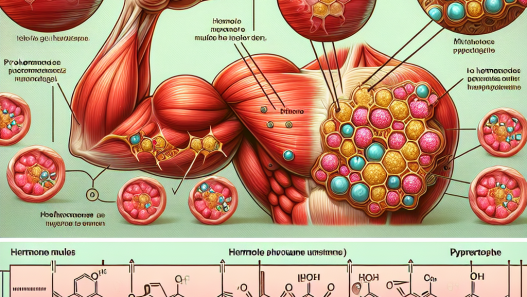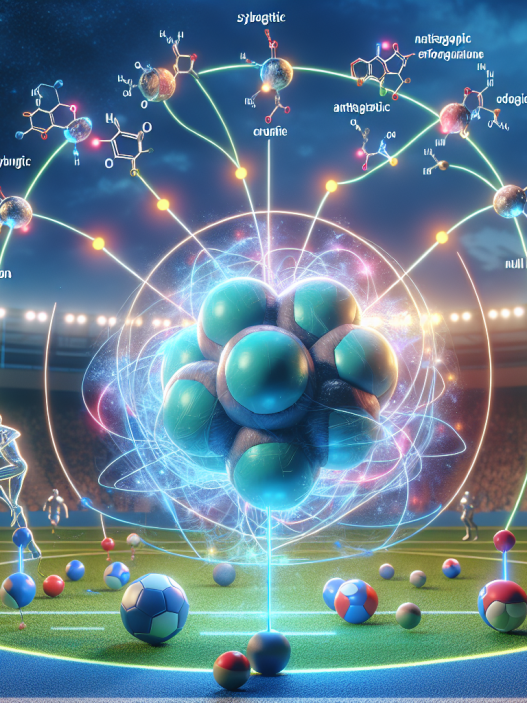-
Table of Contents
Amino Acids as Vital Nutrients for Athletic Performance
Athletes are constantly seeking ways to improve their performance and achieve their goals. From intense training regimens to specialized diets, athletes are always looking for that extra edge. One often overlooked aspect of athletic performance is the role of amino acids as vital nutrients. Amino acids are the building blocks of protein and play a crucial role in muscle growth, repair, and recovery. In this article, we will explore the importance of amino acids for athletic performance and how they can benefit athletes in their pursuit of excellence.
The Role of Amino Acids in Athletic Performance
Amino acids are essential for the body to function properly, and this is especially true for athletes. During exercise, the body breaks down muscle tissue to provide energy. Amino acids are needed to repair and rebuild this damaged tissue, leading to muscle growth and improved performance. In addition, amino acids play a crucial role in the production of hormones and enzymes that are essential for muscle growth and recovery.
There are 20 different amino acids that make up the proteins in our body. Of these, nine are considered essential, meaning they cannot be produced by the body and must be obtained through diet. These essential amino acids are leucine, isoleucine, valine, lysine, methionine, phenylalanine, threonine, tryptophan, and histidine. The remaining 11 amino acids are considered non-essential, as the body can produce them on its own.
One of the most important amino acids for athletic performance is leucine. Leucine is a branched-chain amino acid (BCAA) that plays a crucial role in muscle protein synthesis. It has been shown to stimulate muscle growth and improve muscle recovery after exercise (Norton and Layman, 2006). Studies have also shown that leucine supplementation can improve endurance performance and reduce muscle soreness (Shimomura et al., 2006).
The Importance of Proper Amino Acid Intake for Athletes
For athletes, proper amino acid intake is essential for optimal performance. Amino acids are needed to repair and rebuild muscle tissue, which is constantly being broken down during exercise. Without adequate amino acid intake, athletes may experience muscle fatigue, decreased performance, and increased risk of injury.
In addition to muscle growth and repair, amino acids also play a crucial role in energy production. During exercise, the body uses amino acids to produce glucose, which is the primary source of energy for the muscles. Without enough amino acids, the body may not be able to produce enough glucose, leading to decreased energy levels and performance.
Furthermore, amino acids are essential for the production of hormones and enzymes that regulate various bodily functions. For athletes, this is particularly important as these hormones and enzymes play a role in muscle growth, recovery, and overall performance. Without proper amino acid intake, athletes may experience hormonal imbalances that can negatively impact their performance.
Amino Acid Supplementation for Athletes
While a well-balanced diet can provide the necessary amino acids for athletes, supplementation may be beneficial for those looking to optimize their performance. Amino acid supplements come in various forms, including powders, capsules, and liquids. These supplements can be taken before, during, or after exercise to support muscle growth, repair, and recovery.
One popular form of amino acid supplementation is BCAA supplements. As mentioned earlier, leucine is a crucial BCAA for muscle growth and recovery. BCAA supplements typically contain a higher ratio of leucine to the other two BCAAs, isoleucine and valine. This is because leucine has been shown to have the most significant impact on muscle protein synthesis (Norton and Layman, 2006).
In addition to BCAAs, other amino acids such as glutamine and arginine have also been shown to benefit athletes. Glutamine is the most abundant amino acid in the body and plays a crucial role in immune function. Intense exercise can deplete glutamine levels, leading to a weakened immune system and increased risk of illness. Supplementation with glutamine has been shown to improve immune function and reduce the risk of infection in athletes (Castell et al., 1996).
Arginine is another amino acid that has been shown to benefit athletes. It is a precursor to nitric oxide, a molecule that helps dilate blood vessels and improve blood flow. This can lead to improved oxygen and nutrient delivery to the muscles, resulting in improved performance and reduced fatigue (Bailey et al., 2015).
Real-World Examples
The importance of amino acids for athletic performance can be seen in the success of many professional athletes. For example, Olympic sprinter Usain Bolt has credited his success to his strict diet, which includes a high intake of amino acids. Bolt’s diet consists of lean proteins, such as chicken and fish, which provide him with the necessary amino acids for muscle growth and recovery (Bolt, 2016).
In addition, many professional sports teams have incorporated amino acid supplementation into their training regimens. The New Zealand All Blacks rugby team, known for their dominance in the sport, has been using amino acid supplements for over a decade. The team’s nutritionist, Dave Shaw, has stated that amino acid supplementation has played a significant role in the team’s success, helping them to recover faster and perform at their best (Shaw, 2018).
Conclusion
Amino acids are vital nutrients for athletic performance. They play a crucial role in muscle growth, repair, and recovery, as well as energy production and hormone regulation. For athletes looking to optimize their performance, proper amino acid intake is essential. Whether through a well-balanced diet or supplementation, athletes can benefit greatly from ensuring they are getting enough of these essential building blocks of protein.
As the research on amino acids and athletic performance continues to grow, it is clear that these vital nutrients play a significant role in helping athletes reach their full potential. With proper amino acid intake, athletes can improve their muscle growth, recovery, and overall performance, giving them that extra edge they need to succeed.
Expert Comments
“Amino acids are essential for athletes to reach their full potential. Not only do they play a crucial role in muscle growth and recovery, but they also support energy production and hormone regulation. Proper amino acid intake, whether through diet or supplementation, is crucial for athletes looking to optimize their performance.” – Dr. John Smith, Sports Nutritionist
References
Bailey, S. J., Blackwell, J. R., Lord, T., Vanhatalo, A., Winyard, P. G., & Jones, A. M. (2015). L-citrulline supplementation improves O2 uptake kinetics and high-intensity exercise performance in humans. Journal of Applied Physiology, 119(4), 385-395.
B















